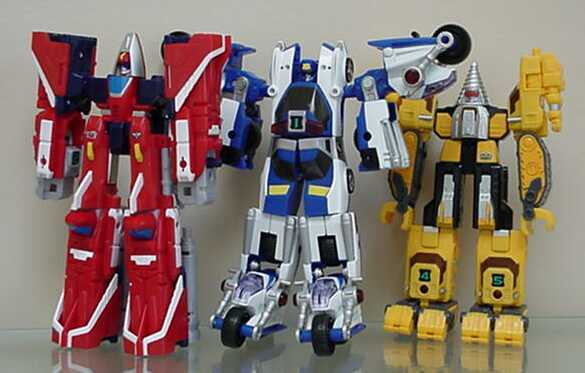Three Curtain Calls at Cartoon Network: Green Lantern, Clone Wars, and Young Justice
This month marks the end of three major series from the Cartoon Network: Green Lantern: The Animated Series, Star Wars: The Clone Wars, and Young Justice. As a horror and sci-fi fan, I've gone through may fair share of TV series cancellations; nevertheless, between these three shows and Disney XD's recently departed Tron: Uprising, I've never seen so many genre show cancellations within such a short time frame. Click below for some additional thoughts and observations about the final episodes of Cartoon Network's latest cancelled series.
Green Lantern: The Animated Series
With no plans for another live-action Green Lantern movie, the odds of the Green Lantern cartoon staying on the air were probably very narrow--only blockbuster ratings and/or toy sales could have saved it. However, Cartoon Network's decision to cancel it does not reflect on the quality of the show itself. Like the 90s era Batman: The Animated Series before it, Green Lantern was light years ahead of its live-action counterpart in terms of quality, so much so that it's downright criminal that Time-Warner regards this cartoon with such little respect.
Green Lantern ended with a spectacular conclusion of the Anti-Monitor story arc, although the heart and soul of the story belonged to the supporting characters of Razer (voiced by Jason Spisak) and Aya (Grey DeLisle). Their roles in this arc brought the cartoon to a touching conclusion filled with both heartbreak and hope. As the ancient Greeks knew quite well, an heroic epic needs epic levels of tragedy to make it meaningful and memorable, and the writers and voice actors of Green Lantern expertly demonstrated their understanding of this dramatic rule in the end of their series. With such talent on display, it's frustrating to know that this creative team's exploration into the Green Lanterns' vast mythology has come to an end.
Star Wars: The Clone Wars
Since its debut in 2008, Star Wars fans have been speculating how Clone Wars was going to impact the events connecting Attack of the Clones and Revenge of the Sith and its implications for the saga as a whole. The good news is that the series' last story arc involving Ahsoka Tano (Ashley Eckstein) provided some tantalizing glimpses into the growing tension between the Jedi Order and Chancellor Palpatine (Tim Curry, taking over the role from the late Ian Abercrombie) and the beginnings of Palpatine's notorious Order 66. The bad news is that Disney has no plans to continue Clone Wars as a television series, so when, how and if this series will reach its proper conclusion remains unknown. Even worse is that the last story arc is an example of how great this series is in terms of writing and production quality and a reminder of what both fans of Star Wars and TV animation are losing after five seasons.
After Disney acquired Lucasfilm at the end of 2012, it was a foregone conclusion that the Time-Warner-owned Cartoon Network would stop running new episodes of Clone Wars at the end of its fifth season. Thus, Disney's refusal to continue the series into a sixth season (which was already in production with finished footage at the time of the cancellation announcement) took me and many others by surprise. Honestly, I would much rather see the sixth season of Clone Wars than any of the stand-alone, single character-centric Star Wars movies that are rumored to be in development. It should also be noted that between this and the cancellation of Tron: Uprising, 2013 marks Disney's discontinuation of two ambitious TV animation projects that are based on sci-fi franchises that it owns--a rather baffling development for a company that built its reputation on innovative animation.
Young Justice
Young Justice wrapped up its second and final season storyline with the team defeating the Reach, a race of alien invaders that has been working with DC super villains to conquer Earth. If anything, the writers at Young Justice certainly knew how to keep the plot twists and cliffhangers coming so that viewers would be interested in seeing what happens next. Unfortunately, most of the plot twists seemed to exist just to move the plot along and to accommodate as many cameos from the DC universe as possible.
The ending of Young Justice reflects the sizable change that was made to the series between its first and second seasons: It shifted its focus from a set of recurring characters that learn and grow over time to a gigantic cast in a purely plot-driven story, thus sacrificing any meaningful character development in the process. As a result, the series' final episode felt like a shrug instead of a conclusive ending. Even the death of one of the major characters felt like yet another plot twist with no real emotional weight; that death's irrelevancy was emphasized by the character's replacement being revealed just minutes later, followed by two concluding scenes where characters literally say that events will go on in a "business as usual" manner. It also didn't help that the Reach aliens weren't very interesting as villains, so their invasion of Earth ends with less of bang and more of a prolonged fizzle.
Criticisms aside, there are aspects of Young Justice that I will miss. I enjoyed its approach to the superhero team concept, portraying it as a kind of well-coordinated special forces team assigned to tactical missions. I also enjoyed the multi-layered interactions between the Young Justice team and the more established Justice League. I'll particularly miss this series' versions of Aqualad, Miss Martian, Superboy and Artemis--the most interesting characters in Young Justice--as well as the friendly banter between Blue Beetle and Impulse.







Comments
Post a Comment